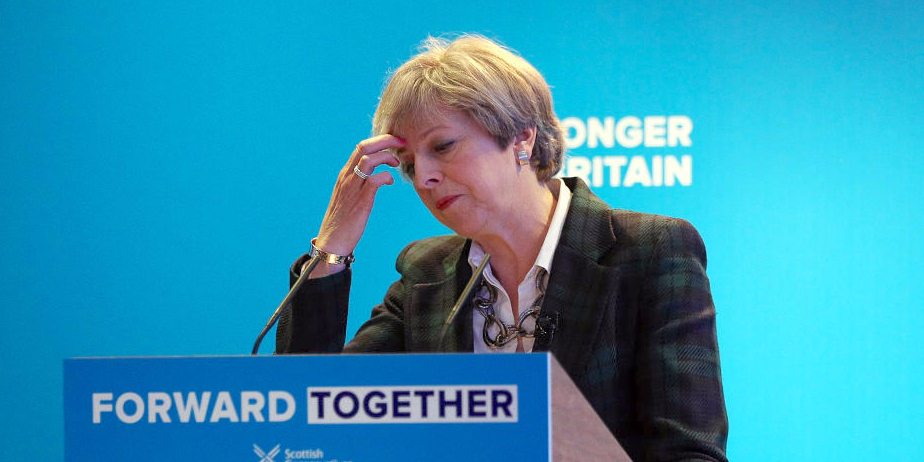- Theresa May suffers backlash after announcing plans to reform social care. Conservative poll lead has been slashed in half since May announced the policy. Tory campaign has bought up ads telling voters the “real facts” about their plans. Partial U-Turn expected to be made on policy dubbed the “dementia tax”.
LONDON – Until last week the Conservatives looked on course for a landslide general election victory. Polls suggested the party were set to win a 100-200 seat majority with Labour risking being reduced to a rump of fewer than 150 seats.
That may still happen. In the last two elections, the Conservative Party went on to do significantly better on election day than the polls suggested they would at this same stage in the campaign. The Tories also have lots of mud still to sling at the Labour leader, with this weekend’s stories linking him to the IRA, just the beginning of what Jeremy Corbyn can expect.
But for the first time in this election campaign a Conservative landslide victory is no longer a certainty. Here’s why:
The Dementia tax
When the Conservatives released their manifesto last week the proposed changes to social care stood out. Under the plans, anyone who receives care in their own home will have to pay for it through the value of their home once they have passed away. This means that the entire value of a person’s home, apart from the first £100,000, will be claimable by the state.
The policy, along with other pledges to end universal winter fuel payments for pensions and end the 'triple lock' on pensions, raised eyebrows as they target the very people who make up the bulk of Conservative support.
The Tories are losing older voters

Support from the "grey vote" has been behind the surge in support for the Tories in recent months, with older former-UKIP voters flocking to the party. According to an exclusive Business Insider /GfK poll conducted before the launch of the Conservative manifesto, 68% of voters over 65 planned to vote for the party, with just 16% backing Labour. With older voters being much more likely to vote, the chances of a Conservative landslide had looked nailed on.
However, since the launch of the manifesto there are signs that this support could be eroded. A new Survation poll for Good Morning Britain out today found that Labour are now ahead of the Conservatives on which party has the best polices for older people and pensioners, by 37% to 26%. Older voters themselves are now evenly split between the two parties with 35% saying each party has the best policies for pensioners.
Overall the Conservative lead over Labour has halved since the manifesto launch according to two polls in recent days.
Conservative candidates are worried

This change is being noticed by Conservative candidates in marginal seats.
"This plan was coming up on the doorstep this morning and there has not even yet been much coverage of it," one Tory candidate told the Times at the end of last week.
"It is very hard to justify, because older people with a house of £300,000 could have a liability of £200,000," they added.
A former cabinet minister told the paper they had resorted to telling constituents that the plans would be changed, despite having no knowledge whether this was the case.
Meanwhile, another Tory candidate told the paper that the author of the policy "should be shot".
On Sunday, the Conservative-supporting Mail on Sunday, turned on the party with a front page splash using Labour's description of it as a "dementia tax".
The Conservative campaign is worried
This is all starting to worry the Conservative campaign, which has resorted to buying ads about the policy. Now anyone searching for "Dementia Tax" on Google today will find that the first link is a sponsored one by the Conservative party titled "The so-called 'dementia tax' - get the real facts - conservatives.com"

The first paragraph of the linked page shows how eager the campaign is to move off of this subject. It reads that: "Social care is one of the great challenges that we face as a nation," before going on: "But the biggest challenge of all is making sure that we get the Brexit deal right.
"Only by getting a good Brexit deal will we be able to continue to fund our public services, like social care. That is why it's important to vote for Theresa May and her Conservative team on 8th June."
Even members of May's own Cabinet are beginning to express unease about the policy, with the foreign secretary Boris Johnson telling ITV on Sunday that "I do understand people's reservations and the questions people are asking about some of the detail about this... As the prime minister has said there will be a consultation on getting it right."
One minister complained to the Financial Times that the policy had come "out of the blue". Another candidate told the paper: "Most people are just confused as they don't know if it affects them," he said. "It has been poorly communicated."
The problem is not going away
All major political parties now accept that there is a growing crisis in social care in this country. However it is a crisis which successive government's have shied away from tackling for the simple reason that it risks losing support among those people who are most likely to vote.
Today former Chancellor and Evening Standard editor George Osborne reported that there is to be a partial U-Turn on the policy, with a new cap put in place on total contributions.
U-turn coming on social care. There will be a cap. Read today's @EveningStandard for the details
— George Osborne (@George_Osborne) May 22, 2017
The Evening Standard suggests that the precise nature of this cap will be decided later in the year.
Whether or not this will be enough to tackle growing voter anger over the policy remains to be seen. But whatever happens in this election, the political difficulties in tackling the social care crisis are not going to go away any time soon.

